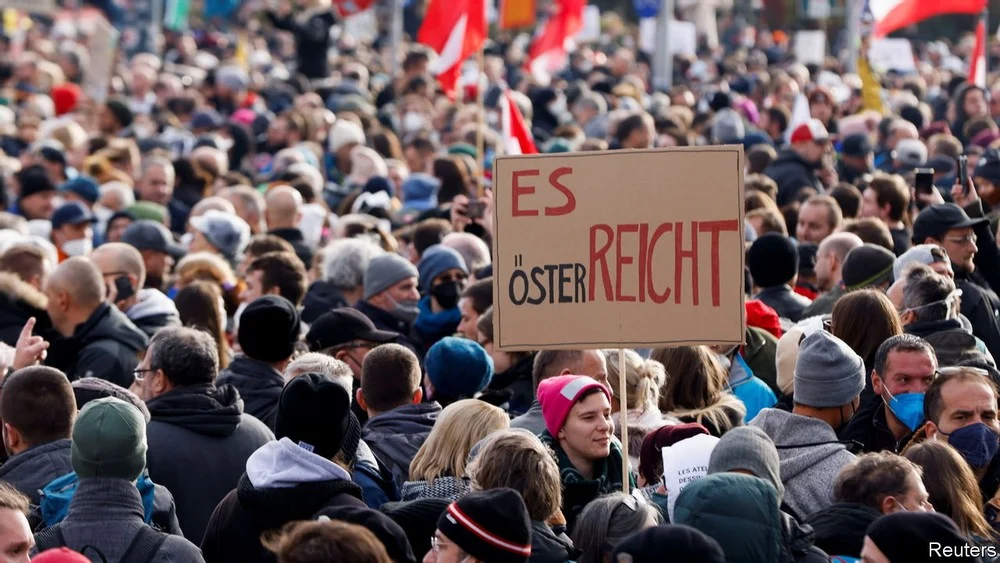BERLIN — THE SIGHT of 40,000 unvaccinated Austrians marching through their capital, Vienna, in recent days was troubling twice over. The tightly packed opponents of pandemic lockdown measures were at risk of spreading the coronavirus. They also threatened to stir up an already tense political situation. Karl Nehammer, Austria’s interior minister, warned that anti-vaxxers in the Alpine republic are growing ever more radicalised. He called their demonstration “incensed” and “aggressive”. Some protesters were provocative in the extreme, carrying placards likening Alexander Schallenberg, Austria’s new chancellor, to Josef Mengele, the sadistic physician at the Nazi concentration camp in Auschwitz. A few wore Judensterne, the yellow badges that the Nazi regime forced Jewish citizens to wear, with the inscription “unvaccinated” instead of “Jew”.
The protesters marched against Austria’s increasingly tough measures against anti-vaxxers. On November 22nd the government imposed a full lockdown once again, to last for ten days, which compels Austria’s 9m people to hunker down at home, leaving only for work, essential shopping and exercise. Officials urged those who can do so to work from home. Those in the workplace must be vaccinated, certified immune through recovery or tested daily. Though schools will remain open, parents have been urged to keep their children at home when they can. Austria is also the first Western democracy to make covid-19 vaccinations mandatory for all, starting on February 1st 2022. “For a long time—maybe too long—I and others assumed that it must be possible to convince people in Austria to voluntarily get vaccinated,” said Mr Schallenberg when he announced his “very difficult” decision. So the voluntary option is to end.
Europe, once again, is at the centre of the pandemic. Cases are surging as the contagious Delta variant makes its way, belatedly, through Europe’s population. The World Health Organisation reported this month that coronavirus deaths in Europe rose by 5% in the week of November 8th–the only region in the world where covid-19 deaths increased. Hans Kluge, the boss of the WHO, warned that by March Europe could see another 500,000 deaths.
Will more countries respond with the sort of strict measures seen in Austria? As hospitals in central Europe fill up, anxiety grows. Around 65% of the total population in the European Union are fully vaccinated, but vaccination rates vary greatly between countries. Farther west, they are remarkably high. Among the over-12s in Portugal, more than 88% of the population is fully vaccinated. By contrast, in eastern parts of Poland, less than 40% are jabbed. In Bulgaria the share is below 25%. Within Germany, there are also large geographical variations. In some western parts of the country, such as the city-state of Bremen, nearly 80% of the adult population has had both jabs. In Saxony, however, little more than half the population is fully protected.
Other governments have imposed compulsory covid vaccinations for specific groups. Italy’s made them obligatory for health-care employees in May. In October the rules were expanded to cover all workers in public or private companies, unless they could prove they were immune or had tested negative within the past 48 hours. Those who did not comply faced suspension. Over 2,000 doctors were suspended by the end of October, according to Italy’s medical association, though many were eventually reinstated after getting the jab. Similarly, France made vaccination compulsory for health staff as well police and fire fighters in September. Those who refuse may be suspended without pay.
In Germany support for a nationwide vaccine mandate, previously a taboo, is rising. Prominent politicians had repeatedly promised that such a mandate would not be considered. But Daniel Günther, the state premier of Schleswig-Holstein, and Markus Söder, his Bavarian counterpart, now back the measure for the entire federal republic. Many Germans agree. A survey of 7,500 respondents, conducted in the past few days by Civey, a pollster, suggests that 70% would favour an Austrian-style vaccine mandate, whereas only 20% would be against.
As such mandates are becoming likelier in many places, the polarisation between rival camps is growing. Anti-vaxxers consist mainly of supporters of populist and far-right parties, but also acolytes of alternative medicine, hippies and libertarians. Some are taking to the streets. Over the weekend thousands of opponents of measures to fight the pandemic marched in the Benelux countries, Italy, Switzerland and northern Ireland. In Belgium and the Netherlands rioters clashed with the police over three days. The mayor of Rotterdam lamented what he called “an orgy of violence”. The Dutch rioters were incensed by a partial lockdown that bars the unvaccinated from many public places and requires restaurants to close by 8pm. Thierry Baudet, leader of the far-right Forum for Democracy, recently said that he believes such measures make “the unvaccinated the new Jews”.
Andrea Ammon, the head of the European Centre of Disease Prevention and Control, has warned that vaccine mandates could provoke more resistance from anti-vaxxers. That looks more than likely and especially in places, like Germany, where politicians had insisted for months that vaccinations would never be mandatory. Some degree of popular anger, though voiced in extreme terms, thus looks inevitable. Public officials made their promises when taming the pandemic looked doable. Now, however, just as winter weather is forcing more people together indoors and the Delta variant is thriving, the pressure to return to lockdowns and resort to tougher vaccine mandates looks ever harder to resist.
By The Economist





